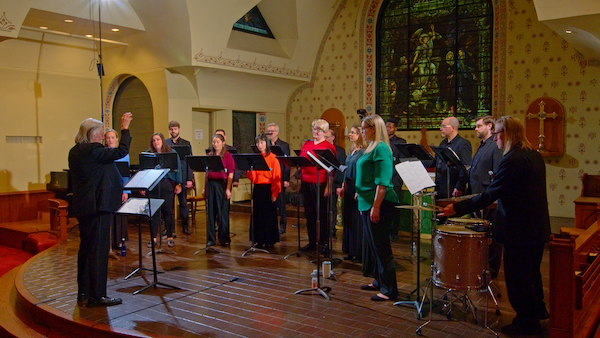New York Virtuoso Singers fete American invention from Billings to Zummo

On Sunday at Christ & St. Stephen’s Church on New York’s Upper West Side, The New York Virtuoso Singers conducted by Harold Rosenbaum presented a concert titled “American Invention.” The program spanned the history of the United States of America and made one thing abundantly clear. American composers were witty and adventurous from the get-go, especially when it came to choral music.
Founded in 1988 by Rosenbaum, NYVS is a professional ensemble known for its performances of complex contemporary choral music. Yet the ensemble is clearly stylistically at home in repertoire from any era. For this concert, its sound was full-bodied and vibrant. Intonation was near perfect, as was the singers’ sensitivity to texts. In short, nothing could have been more American in sound or spirit.
The earliest of the two composers whose works were performed, New Englanders William Billings and Charles Ives, were the true iconoclasts of the lot. The Billings that stirs the soul and fans the flames of patriotism was heard in the four-part round “When Jesus Wept”, but “Modern Music” and “Jargon” were revolutionary then and still amaze today. The latter evoked the boisterousness of a Philadelphia Mummer’s Day Parade, even ending with a cymbal crash.
The NYVS excels where precision is key, an essential quality in music of Charles Ives and Milton Babbitt. Ives’ “Psalm 67” is a bitonal work, with the women singing in C major and the men in G minor. Each dissonance emerged clear and sure. The serialist Babbitt was equally radical, but his Music for the Mass is an early work, of which only the “Kyrie” was heard. It is notable for its rigorous contrapuntal style, chromaticism and lyricism. Qualities not generally associated with Babbitt, but which this performance highlighted.
Henry Cowell’s “Sweet was the Song the Virgin Sang” with its lovely melody was given a serene and tender reading. The most sorrowful of all the works performed was Florence Price’s “Resignation”, for which she wrote both the text and the music. It is the haunting lament of a slave, who has experienced just one fleeting moment of happiness and longs for death. Rosenbaum and his singers did full justice to the spaciousness and beauty of Price’s choral writing.
Although Rosenbaum paid tribute to the past, the real draw of the program were works of the here and now, especially ones that were new to New York audiences.
Pulitzer Prize winner and Kennedy Center honoree, Tania León’s three-movement work Rezos (Prayers) is a setting of excerpts from the Antiguan-American writer Jamaica Kincaid’s collection, At the Bottom of the River. León has described the work as a“sound palette”; the atmosphere her music created left a far stronger impression than the text, especially in the rapid-fire first movement. Its most memorable moments were in the third part with the choir’s repeated singing of the refrain,“ Sing again, Sing now,”.
Elena Ruehr and Peter Zummo are masterful musical painters. Ruehr’s setting of Langston Hughes’s text, ”In Time of Silver Rain”, evokes the joys of renewal in textures both complex and simple, ending with the sopranos soaring into the stratosphere. Zummo takes the listener inside the mind of a person watching the nighttime flow of traffic in “Blue Headlights”. He depicts a wondrous world of color and motion from which the observer is far removed. The work’s bittersweet dreaminess enhanced by the scintillating sounds of the cymbal and glockenspiel.
There were also two delightful portraits of animals on the program. In “Dog from Duluth”, Edie Hill’s simple, imaginative setting permitted the singers to luxuriate in misty, nostalgia over fond memories of a treasured companion. Wit prevailed in David Patterson’s “The Opossum”, a setting of John Gardner’s story of one of God’s natural experiments gone astray. Each repetition of the word opossum evoked a smile, as the chorus emphasized the consonants with glee.
William McClelland’s “Hail Lovely and Pure” is a remarkable work. Setting a short text from a fifteenth-century mystery play, The Second Shepherds’ Play, captures the first lines spoken by the shepherds when they enter the stable to greet the newborn Christ Child. McClelland creates a choral fantasy out of the short text which combines the medieval and the modern. The NYVS conjured the mystery of the scene, as well as the power of triumph over evil that ends the work.
The concert ended with William Appling’s well-known setting of the spiritual “We Shall Walk in the Valley in Peace”. It’s an American musical gem that never loses its appeal, especially when performed with such sincerity.
The New York Virtuoso Singers continues its series “The Unadorned Bach” February 25 at Merkin Concert Hall. nyvirtuoso.org
Posted Feb 20, 2023 at 10:34 pm by Harold Rosenbaum
Dear Mr Perdian,
Thank you for a wonderful and thoughtful review.